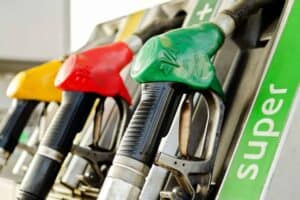Major chains are incurring massive fuel and food waste costs due to rolling blackouts.

The largest supermarket retailers in South Africa have now spent nearly R3 billion on diesel, to enable them to run generators so they could trade through the near-constant load shedding over the past nine months.
The bulk of this expense came in the period between October 2022 and May 2023, as daily power cuts intensified with days-long bursts at Stage 6.
A Moneyweb analysis shows that while public disclosures for the four largest retailers total R1.9 billion, because this data runs to between January and March (at the latest, in the case of The Spar GroupThe Spar Group), it is practically certain that spend is near – or has even exceeded – R3 billion by this stage.
Load shedding this calendar year (in terms of gigawatt hours) has already surpassed the total amount for 2022.
Together, the Shoprite Group and Pick n Pay have spent R1.1 billion in so-called “incremental” diesel costs to keep refrigerators and lights on and stores open.
Shoprite’s more-than half-a-billion-rand bill was for the six months to 1 January, while its rival’s cost was for a full year to the end of February (with the vast majority between September and February). Shoprite has said “the cost of diesel to power our generators, however, is expected to remain significant and as a result is expected to materially increase our operating expenses for the remainder of the year”.
It is incredibly likely that the spend for the current six months (to 3 July) will be at or higher than the R560 million incurred in the prior half year.
ALSO READ: Eskom’s ‘yo-yo load shedding’ adds insult to injury
Illustrative diesel cost
Beyond the half a billion already spent, Pick n Pay provided an illustrative incremental diesel cost of R477 million for the current financial year, which will be partially offset by energy savings (R85 million). This net incremental cost of R393 million is aggressive, but probably fair, as it is based on annualising the January/February run rate (during which load shedding was particularly acute).
In an effort to soften this bill, it is aiming to take a further R200 million in energy costs out of the business this year.
Last week, The Spar Group said it estimated “the added cost of diesel incurred by our retailers required to run generators during the period (six months to end March), amounted to more than R700 million”. The majority of Spar stores are independently owned and operated. This means any efficiencies in the procuring and delivery of diesel will be harder to achieve than in the case of its competitors.
ALSO READ: Eskom’s loadshedding saga continues: Find the wretched money for the diesel!
Wasted food
Woolworths previously said its additional diesel spend for generators totalled R100 million in the six months before Christmas. This was primarily in its food business, where waste increased by 0.1% (a R20 million knock).
During Stage 6 load shedding, Woolworths says it incurs costs of between R20 million and R30 million a month due to diesel and higher waste.
It says its “primary objective is to protect the quality and integrity of our superior cold chain. We have made significant past investments in our energy supply capabilities, with 99% of our stores and all our distribution centres already equipped with generator capacity.”
If the chain is broken for eight consecutive minutes, the retailer considers the food spoiled and food is removed from shelves and donated to food charities.
The R3 billion estimate excludes the money spent by the major property groups on generator power for shopping malls.
ALSO READ: Shoprite spent more than half a billion (with a ‘B’) to keep lights on during load shedding
Clothing and pharmacy retailers impacted
Generally, much of this is recovered in bills to tenants (and some would form part of the diesel spend quoted by the supermarket groups), although power needs in common areas are for the property owner’s account. For the last nine months, this has been estimated at over R500 million, based on publicly available data. The estimate also excludes other retailers.
Pepkor said last week its diesel costs more than doubled to R72 million due to load shedding, while Dis-Chem said it spent R39 million to “support trade” during power interruptions.
The total broader retail figure is easily another R1 billion.
Food retail executives have openly criticised the relief on the diesel fuel levy announced in February’s Budget Speech. This refund was extended for a period of two years to food manufacturers, not retailers.
ALSO READ: Good news: Petrol and diesel to decrease from Wednesday, 7 June 2023
Road Accident Fund levy debate
Manufacturers are able to get a refund on 80% of the Road Accident Fund (RAF) levy (currently R2.18 per litre).
Using an approximate price of R20 per litre, this means that the country’s largest retailers would’ve unnecessarily contributed close to R200 million to the RAF when buying diesel for generators. This same argument is being put forward by other quarters who are spending millions of rands on diesel that simply isn’t being used on the country’s roads.
The general fuel levy however, which is about 20% of the retail price, remains payable in all instances – even for those who qualify for the rebate. This is not a massive source of tax revenue for government (about 6%), but according to Statistics SA it generates more income than customs duties or excise duties on alcohol and tobacco products.
This article originally appeared on Moneyweb and was republished with permission.
Read the original article here.
Support Local Journalism
Add The Citizen as a Preferred Source on Google and follow us on Google News to see more of our trusted reporting in Google News and Top Stories.








